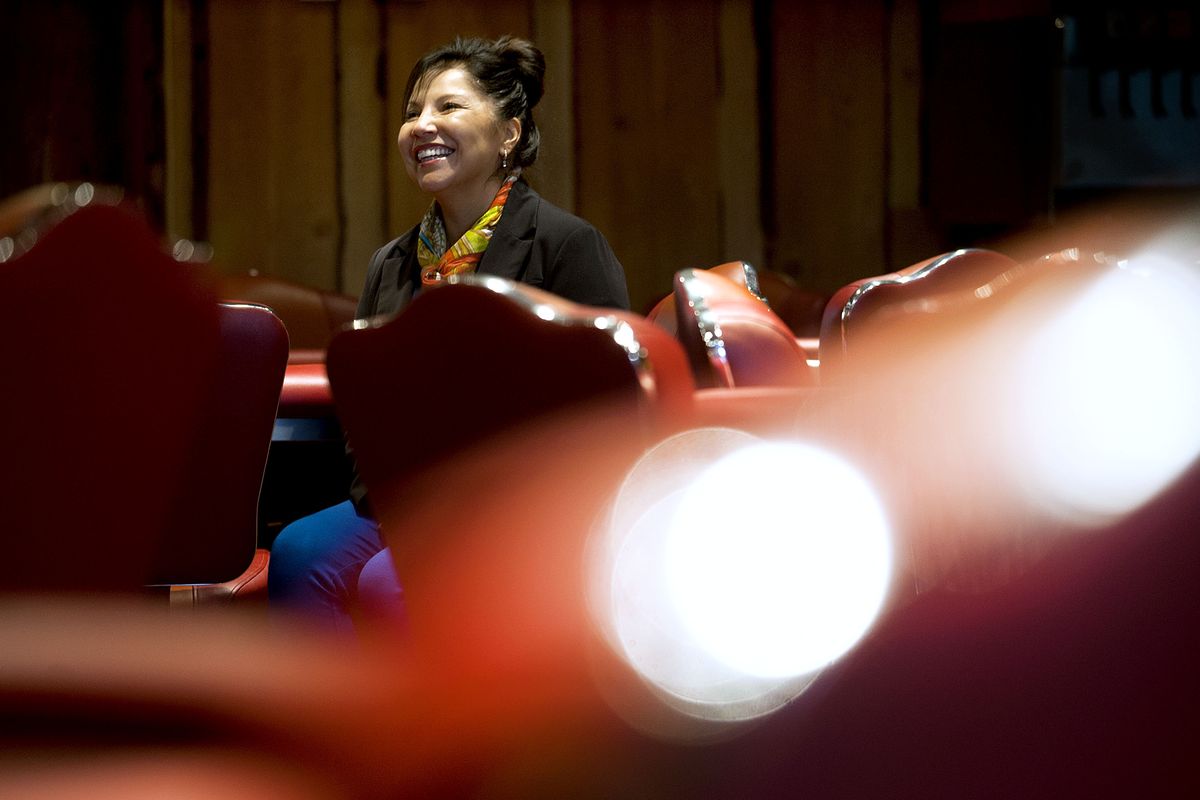Coeur d’Alene Tribe’s plan to offer poker at casino at odds with Idaho
Laura Stensgar, executive marketing director for the Coeur d’Alene Casino Resort and Hotel, talks about the new poker room at the casino in Worley, Idaho, on Monday. Offering poker will allow the casino to attract new clientele, said Stensgar. (Kathy Plonka)Buy a print of this photo
WORLEY, Idaho – The Coeur d’Alene Casino is ready to shuffle up and deal.
The casino is advertising a May 2 opening date for its new poker room, with executives saying that Idaho’s constitutional ban on poker games doesn’t apply to the tribal-owned casino.
But the Idaho Lottery Commission has different views, setting up a potential showdown over the casino’s six poker tables.
The Coeur d’Alene Tribe plans to offer Texas Hold ’Em and Omaha at the casino. Those are card games of skill with players competing against each other for stakes and no house bank involved, said Helo Hancock, the tribe’s legislative director.
The tribe has sought several legal opinions on poker games. Based on those reviews, tribal and casino executives believe poker is exempted from state regulation under the federal Indian Gaming Regulatory Act, Hancock said.
Jeff Anderson, director of the lottery commission, said the state has a different interpretation. The Indian Gaming Regulatory Act does exempt some non-house banked card games on tribal lands from state regulation, but only when the games aren’t prohibited by state law, he said.
“Poker is specifically prohibited in Idaho,” said Anderson, noting that a Boise man recently was arrested for running an illegal card room.
Last week, Anderson sent a letter to the National Indian Gaming Commission asking it to weigh in. The commission regulates gaming that falls outside the Coeur d’Alene Tribe’s compact with the state, which covers slot machines, Anderson said.
The situation is somewhat unusual, according to Eric Shepard, the Indian gaming commission’s acting general counsel, who said he’s not aware of parallel incidents in other states.
“We’re aware of the tribe’s intention to offer poker, and we’re working through our own analysis of the matter right now,” Shepard said Wednesday.
Casino executives have considered offering poker for several years. Marketing studies indicate the casino south of Coeur d’Alene is losing business to Indian casinos in Washington that offer card games, and to commercial card rooms, which also are allowed in Washington, said the tribe’s Hancock.
The casino, which includes a hotel and golf course, is the tribe’s largest economic venture, employing 900 to 1,200 people, depending on the season. Revenues help support the tribe’s programs for education and social services, a community health clinic and infrastructure on the reservation.
“We’ve been looking at ways to stay competitive in the gaming industry,” Hancock said. “Poker is something that we consistently get requests for.”
Offering poker games will allow the Coeur d’Alene Casino to attract new clientele, said Laura Stensgar, the casino’s executive marketing director.
The vast majority of poker players are men, ages 25 to 55. That’s a younger demographic than clients who play the casino’s slot machines, Stensgar said.
“It’s a way to broaden the experience,” she said. “The husband plays poker; the wife plays the slot machines or goes to the spa. They stay to have dinner together.”
The casino has hired 16 people to staff the poker room as dealers and in other positions.

